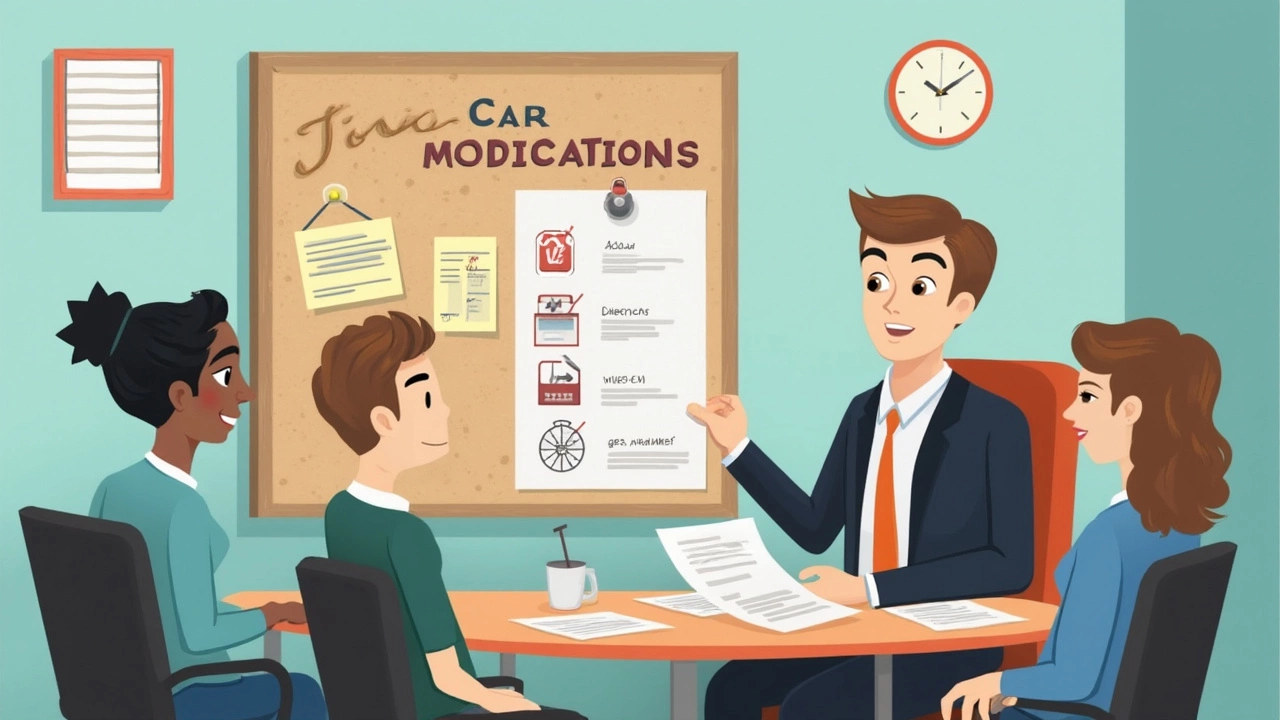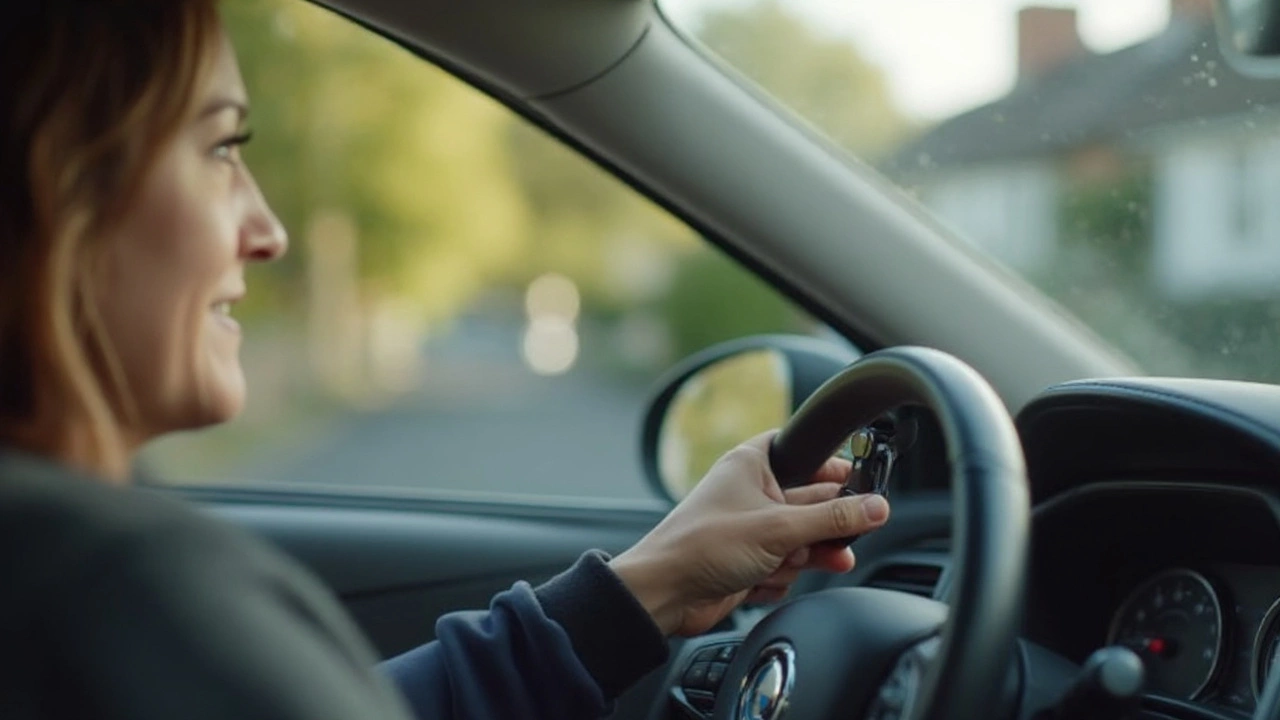Ever stuck a dash cam on your windshield and wondered if that tiny camera officially makes your car a "modified" vehicle? It sounds silly, but depending on who you ask—insurance companies, dealerships, or picky MOT testers—you might get different answers.
Plenty of people are quick to plug in new tech, but not everyone thinks about the paperwork or insurance calls that should come with it. A dash cam doesn’t turn heads like a massive spoiler or new side skirts, but those little tweaks can still matter, especially if you ever need to file a claim.
If you’re just trying to stay safe or settle arguments over bad drivers, you’re not alone. More drivers are installing dash cams every year—it's almost routine now. But whether or not it “counts” as a modification really depends on how your insurer defines it, and trust me, they love technicalities.
- What Counts as a Car Modification?
- Is a Dash Cam a Car Mod or Not?
- Insurance: When You Have to Tell Them
- Dash Cams vs. Body Kits: Big Differences
- Tips to Stay Out of Trouble
What Counts as a Car Modification?
If you’ve ever tweaked your ride—paint job, wheels, sound system, whatever—you might’ve wondered where the line is. A car modification is basically any change you make to the vehicle that isn’t how it left the factory. Sounds simple, but things get weird once you look at how different companies and insurers define it.
Insurance companies see a modification as anything that changes the original spec. That could be big stuff like installing car body kits or engine swaps, but they also include stuff you might not think of—like changing your headlights, fitting different wheels, or even adding stickers (yep, seriously). Their logic? If it changes how your car looks or performs, it’s a mod.
- Performance mods: Think turbos, exhausts, chips, and even smaller tweaks like air filters.
- Appearance mods: This covers car body kits, custom paint, wraps, spoilers, and window tints.
- Tech upgrades: Sat navs that are hardwired, fancy sound systems, alarms, trackers, and sometimes, yes, dash cams.
Why all the concern? It’s about risk. If your car looks flashier or goes faster, or even just stands out more, insurers figure it’s more likely to get nicked, or cost more to repair. In 2023, a UK insurer survey showed that one in five people didn't tell their insurer about a modification, risking claim refusals or policy cancellations.
| Modification Type | Usually Notifiable? | Insurer Reaction |
|---|---|---|
| Body Kits | Yes | Often higher premium |
| Performance Mods | Yes | Higher risk, higher cost |
| Dash Cam | Sometimes | Low risk, may reduce premium |
| Cosmetic Wraps | Yes | Usually needs notification |
One thing that surprises people—the definition of a modification really depends on your insurer. Some are strict, some barely care about electronics. Always check your policy before fitting new gear, because the fine print rules everything. Missing that step could spell trouble if you ever need to make a claim.
Is a Dash Cam a Car Mod or Not?
Here's the thing: installing a dash cam is way different from putting on a body kit or changing your car’s exhaust. Most insurers and car experts say a dash cam is more like an accessory than a real car modification. After all, you’re not really changing how your car looks or drives—just adding a bit of tech that can help record what’s going on outside and inside the cabin.
There’s no blanket rule, though. Some insurance policies still count anything you add to your car as a “mod,” even small gadgets. They really want to know about stuff that could impact risk or repair costs. But if we’re talking about the basics, a standard plug-in or suction-cup dash cam usually isn’t a big deal. Permanent dash cams wired into your fuse box might get a second look, but even then, most UK and US insurance companies don’t treat them the same as real vehicle upgrades like spoilers, light kits or sports seats.
Here’s a quick way to tell if your dash cam “counts” as a mod with most insurers:
- If it’s not hardwired—just plugged in or stuck with a mount—it’s usually fine.
- If you pay someone to permanently wire it in, or it connects to security features, your insurer might want a heads up.
- If the camera records constantly, or it can double as a GPS tracker, some policies want that listed.
Plenty of car owners never tell insurance about their dash cam and have zero problems, especially with clip-on or removable models. But it isn’t the same everywhere. In Australia, there was a 2023 survey where only 8% of insurers said a regular dash cam would affect your premium. Safety upgrades just don’t matter as much as, say, a full body kit or tinted windows that mess with visibility.
| Dash Cam Type | Usually a Mod? | Insurer Notification |
|---|---|---|
| Clip-on/Removable | No | Not required |
| Hardwired | Rarely | Sometimes required |
| Security-integrated | Possible | Often required |
If you’re ever unsure, just ask your insurer directly. It’s faster to send a quick email or chat than risk them holding it against you after a fender bender. At the end of the day, a dash cam doesn’t scream "custom ride," but letting your insurance know can help dodge any awkward surprises later.

Insurance: When You Have to Tell Them
Here’s the thing: insurance companies are all about knowing what’s changed on your car—even if it’s just a dash cam. Most of the time, installing a dash cam is seen as a minor upgrade and not a true car modification like a car body kit would be. But, there’s no single answer that applies to all insurers. Some are totally fine with it. Others want to know about every tech add-on, even the cheap ones you buy online.
The biggest pain? If you don’t tell them when you should, you risk messing up any future claims. Say you get into an accident, and your insurer finds an unreported device (even a dash cam). They could refuse to pay out, or at the very least, they’ll drag the process out. No one wants that mess.
So, how do you know if you need to report your dash cam to your car insurance company? Here are a few simple pointers:
- Check your policy wording—look for any language talking about electrical upgrades, security devices, or in-car cameras.
- If your dash cam is hardwired (not just plugged into the 12V socket), insurers are way more likely to want to know.
- Bundling a dash cam with other tech or non-factory options? That’s definitely worth flagging.
- Some UK providers, like Admiral and Direct Line, say dash cams don’t count as modifications unless you alter electrical wiring.
- Just checking isn’t enough—drop your insurer a quick message to get your answer in writing, so you’re protected later on.
Here’s a quick look at what insurers in the UK and US usually say about car modifications like dash cams:
| Country | Plug-in Dash Cams | Hardwired Dash Cams |
|---|---|---|
| UK | No need to report, unless policy says otherwise | Report if alters wiring or uses the fuse box |
| US | Rarely seen as a mod, usually fine | Check with insurer—rare, but sometimes counts as electrical mod |
Best advice? Don’t assume. When in doubt, ask your insurer before you stick anything new in your ride. A quick email or call can save you serious headaches if you ever need your insurance to come through. Staying upfront about even small tech like dash cams is a smart move for anyone who wants to avoid drama.
Dash Cams vs. Body Kits: Big Differences
On paper, a dash cam and a car body kit are both technically changes to your car. But in real life—and especially when insurers or car dealers are involved—they’re miles apart in what they mean for your ride.
First off, a dash cam is a small gadget. It plugs in, records video, and is easy to remove. Most dash cams won't touch your car’s electrical system (unless you go for a hardwire kit). If you ever want to sell the car or swap the cam, it usually leaves no trace. Now, a body kit? That’s a whole different beast. We’re talking new bumpers, side skirts, spoilers, and sometimes even totally different headlights or grilles. Fitting a body kit means drilling, bolting, and sometimes even paintwork.
Here's a quick look at how each mod stacks up in terms of what actually changes:
| Feature | Dash Cam | Body Kit |
|---|---|---|
| Affects Car Structure? | No | Yes |
| Easy to Remove? | Yes | No |
| Noticeable to Most People? | No | Absolutely |
| May Change Vehicle Value? | Rarely | Usually |
| Usually Raises Insurance? | Not Typically | Often |
Insurance companies care most about stuff that changes your car’s look, performance, or resale value. That’s why a car body kit always lands in the "please tell us" category—some even consider it a risk due to higher theft rates or costlier repairs. A dash cam might not even register on their list unless you’re doing electrical work or using pro-installed kits.
Another thing to keep in mind: some insurers will actually give lower premiums or perks if you have a top-rated dash cam, since it helps sort out claims after an accident. You’ll never hear that about a wild aftermarket body kit.
If you’re modding your car just to give it flash with a body kit, be prepared for added attention (from both the law and insurance). With dash cams, you’re usually making your life easier in case of a crash or dispute, not turning heads at car meets. The impacts aren’t even close.

Tips to Stay Out of Trouble
So you’ve installed a dash cam and maybe changed up your car body kit too. You want to keep things smooth with your insurance and on the right side of the law. Here’s how you can avoid headaches:
- Tell your insurer, even for small gadgets. Some insurance companies really do want to know about everything, even “minor” car modifications like dash cams. It might seem over the top, but a phone call or a note in your policy can save you from voided coverage later.
- Stick to removable mounts. Suction cup dash cams are popular for a reason. Permanent wiring can count as a more noticeable upgrade (especially if you have to drill or hide cables), so stick with setups you can remove easily if needed.
- Double check local laws. In some countries or states, dash cams are totally fine. In others, rules on passenger privacy or windshield obstruction can get you fined. For example, UK drivers can use dash cams as long as they don’t block the driver’s view or record audio without permission.
- Read the fine print on your policy. Seriously, it can be boring, but that one paragraph buried in your paperwork might say that adding anything with wires counts as a change. If you find those lines, give your insurer a call and ask what counts as a reportable modification—they don’t always list dash cams up front.
- Keep your receipts. If your car insurance ever needs proof of your dash cam or body kit install after a claim, you’ll want to show that you purchased and fitted it legally.
To give you an idea of what insurance companies actually care about, check out this little summary:
| Modification Type | Usually Need to Tell Insurer? | Risk of Voided Cover |
|---|---|---|
| Dash Cam (Removable) | Unlikely, but check | Low |
| Dash Cam (Hardwired) | More likely | Medium |
| Body Kit | Yes, always | High |
The key with vehicle upgrades is to keep things transparent. The golden rule? If you’re ever unsure, ask your insurer and make a quick note of the answer somewhere safe. They’re paid to be picky, and you’re paid nothing for the risk.




